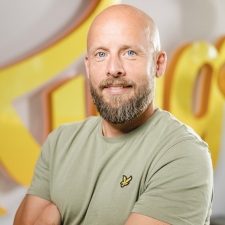This year King turns 20 and to celebrate its ongoing success we paid a visit to King's London HQ to get the latest from the president, Tjodolf Sommestad and key members of his team.
With over 200 million active players, King has become the giant that every other games company keeps tabs on. It seems that when it comes to spinning off brands, creating new extensions and coining highly lucrative cross-promotion opportunities - all the while maintaining a huge audience - nobody does it better.
And in addition to meeting the team behind the hits, there was the small matter of being able to play level 15,000 (you read that right) of Candy Crush Saga, the never-ending smash hit that across its ten-year lifespan has so far earned over $20 billion in revenue, delivered five billion downloads and served an incredible five trillion levels to players all over the world.
And these are players that the company famously works extra hard to keep entertained and coming back for more. The latest batch of levels - including that magical 15,000th level - will be released into the game soon.
We sat down with the king of King, president Tjodolf Sommestad to talk Candy Crush, the company's ongoing international focus and quest for diversity, his take on Microsoft's purchase of the Activision Blizzard King empire, and when exactly a mobile game becomes a ‘saga’…

So with Candy Crush Saga, Farm Heroes Saga, Pet Rescue Saga and more, it’s clear that King loves a good saga… What’s the secret sauce for a saga?
Tjodolf Sommestad: I think it's a relatively simple idea. The way I would define it is that it’s a game that is intended to not necessarily end, so it could be a never-ending saga. So every level is almost like a page in a book. What we're calling an episode is a bit like a chapter and we keep writing new chapters all the time as long as there is interest from our players.
This notion of games as a service has changed conventional narratives. If you were to read a book, as you suggest, that never ended, that first step would feel strange. But with games that aren't going to end, people will set off on that journey. Do you think that's strange?
Well, first of all, it works. But do I think it's strange? More philosophically? No, I don't think so. Because we are changing, it’s not repetitive. So to keep using that analogy, there are many stories that span across multiple novels or multiple books. And we keep expanding the world. And, plus, it's interactive, which is a bit of a difference. So there's a challenge for you in there. And then there's a new challenge in every level - you get one more obstacle to complete.
Maybe at some point the author runs out of ideas…but like, we haven't run out of new interactive content to deliver to players! So I think there are some differences.
When we started having success on mobile, there weren't that many developers that knew mobile, and free to play, or were interested in working with casual games… at all.Tjodolf Sommestad
It was interesting getting a little history of King earlier. You used to have hundreds of games, back when the company was starting out with browser games. And now you really focus down on a few very, very precisely managed games. What's changed and why?
So when I joined the King, the core business at that time was the website of skill games and we had hundreds of games. And the way we talked about technically was that we had ‘the envelope’. Essentially, it was one destination site that you went to where you could play in tournaments against other other players and we kept adding new games that you could play. But there was always a consistency. It was the same type of tournaments and the player would use the same account to make progress through these casual games.
So in that world, the equivalent of when we launched a new game - which we did every second week, or every month - it's a bit like when we launch a new episode now. So it’s like the soccer games today that are almost like that kind of platform of their own. We had the skill game site as a platform where we launched new games every month. Now it's more like a few new episodes with some new variation on gameplay or a new season that comes into each game. And now we’re doing that in Candy, in Soda and in some other games as well.
Do you admire the work of other developers and publishers out there? Do you learn from what other developers are doing?
Absolutely. Many other games companies out there are doing a really amazing job and also, by the way, there are non-games companies that we sometimes look for inspiration in terms of how they manage the business or how they take on trends or build partnerships or interface with customers or technology.
I'm intrigued by the Microsoft takeover of Activision Blizzard and your part within that. Microsoft has come out and said that it’s all about mobile for them. How does it make you feel, that they're openly saying that their desire to acquire King is the reason that the deal exists?
So we'll see if the deal closes. But when I read, there's a lot of news. Since the start Microsoft has said that they are interested in having a better presence on mobile. And clearly, we're a successful mobile games company with more than 200 million monthly customers in our games and have been running a successful games-as-a-service business for a long time and intend to keep doing so for a while going forward. I can see how that could be a value-add for Microsoft, especially given how they talked about our strategy, and have also talked a lot about other games in the portfolio as well.
So there's a bit of a mix, but if the deal will go to a close, I don't know exactly how they think about it, like if we will become a part of Microsoft, but I can see an opportunity for us to partner with them around some innovation they've done around technology, and specifically around AI, that I think could help us make our games better for our players.
So it's a deal that you would like to see, given the green light and finish?
If there is a green light then it would be an opportunity for us to work with Microsoft and partner with them around AI.
It’s been great hearing from all the guys today and their pursuit of refining their games and making everything perfect. As you know, you need to be a little ruthless and let things go because they're not working. What's the story at the minute with a game like Rebel Riders? What’s its place in the King story at the minute?
So it's one of the games that we’ve been working on for a while, and that we have been testing with players as we've always done. Rebel Riders is a bit different to some of our other games in that it's not a clearly casual game. So it's not a puzzle game. It's a different kind of multiplayer game so we’ve tested it more openly in a community in a different way, compared to how we tested our other games. And right now we're in testing mode.
We're evaluating tests as King always has done in its history of games. And we're going to make a decision on how we invest into that going forward. And if we keep investing, how we take it to market.
Supercell, for example, is well known for killing games that it feels are unsuccessful, ending a game that any other developer would kill for. Are you in a similar frame of mind?
I know that they, like King, have a very high bar. And they've talked about extending that. They want to launch games that have a long-lasting impact for people across the world. And that's something that we share with them in that we set a very high bar for the games that we want to take to market.
We don't necessarily always get it right. But that's where we set our bar. And I think that's a similarity. If I just think about it from the King perspective, when you have the potential distraction from the hit games that they already have in the market, that's what's driving us.
We want to have an impact and have a mission to make the world more playful. So how do we do that? It could be through a new hit game, but it could also by making the hit games that we have even better.
What is it that being international brings to King? Stockholm is full of great developers. Why the need for a London office?
Yeah, part of it is history. Like first of all, when we started really having success on mobile, there weren't that many developers that knew mobile, and free-to-play, or were interested in working with casual games…at all. Anywhere in the world. So we had to expand. I had a strategy to expand so we could find out.
So even though there are a lot of great developers in Stockholm - where most developers were originally - it has really served as well to set up studios at other locations where we could attract more talent.
Now, that's 10 years ago. We kept building that talent and kept attracting more talent. And the industry more broadly has matured since, so the process has also been really helpful and is part of our working today. So walking away from that would be more of a problem than a help. I still think it's true that there are talented people in many countries like the UK and so having a location in London is helpful. Barcelona is a big hub for us. We also have teams in the US as well. So we want to be where we can have talent and to collaborate in a good way.
And this has helped us with our diversity, because we are like serving the world with our games. I think there's a bit of a risk if you isolate your development - when you have the kind of audience that we do - to one place. So I think we've turned being in multiple locations into an opportunity rather than a problem. And we’ve collaborated for a while and now so even though the culture might have been born out of Sweden and to some extent, the UK, I think we’ve found a really, really good global mix of talent and also a culture that works in many countries.
These aren’t the type of games that we do, it's not the business model that we have, so I don't think that will change anything dramatically for us.Tjodolf Sommestad
You mentioned free-to-play earlier and obviously that’s done very well for the company. Capcom has plans to charge $60 for Resident Evil on mobile, which seems like a very different position to the kind of thing that King does.
It is. It’s great to see that mobile devices are getting better. We've seen that in many other technologies - announcements that it keeps getting better. It's great for us as well. They open up more opportunities for us to optimise for more higher end devices. These aren’t the type of games that we do, it's not the business model that we have, so I don't think that will change anything dramatically for us. So it's not something that we're specifically going to lean into.
We have our 200 million plus players and they’re all using such a wide range of devices. It's important for us to keep that big footprint wherever casual games can make good. We want to continue to have mass market products and not go niche and too specific on one device to max out those capabilities.
But in the longer term perspective, if it means that the overall quality of devices is going to keep improving, this could open up more opportunities for us too, as it goes more mass market.
More specifically when there's more of them and more people have them, it's more interesting for us to lead into the technology then.
What would it take for King to launch an entirely new game these days? Do you have games under wraps that you're working on?
We are working on concepts. Your games can sometimes be a bit of a starting goal, because we're looking for that next mega hit game like those that have been so successful in our past. And we are making them better and better every month. So it takes a lot for us to take a new game to market.
Our bar is very high that when the test for players we test for ourselves first. We want it to really have the prospect of becoming a big hit game. We're working on it, but it's difficult to predict. So it's hard to say at this early stage. It’s like, if you take it all the way back, we knew that Candy Crush would be a great game but we didn't know it would become this phenomenon.





















